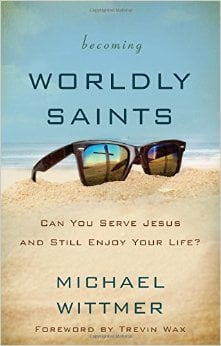⏱️ Estimated Reading Time: 5 min read
 I am a man of many loves. I love movies and music, food and fashion. And Jesus. The last of these must necessarily hold priority of affection in my heart, but often the other interests take up most of my time. This imbalance has often weighed on me and caused no small amount of guilt. How can I love Jesus rightly and yet still enjoy living my life? It’s a question that apparently many ask; in particular it is a question that Michael Wittmer has asked. He asks it again in his newest book Worldly Saints, and offers an encouraging answer. A sound theology of heaven and earth can help to ease the false guilt some have for enjoying life as a follower of Christ.
I am a man of many loves. I love movies and music, food and fashion. And Jesus. The last of these must necessarily hold priority of affection in my heart, but often the other interests take up most of my time. This imbalance has often weighed on me and caused no small amount of guilt. How can I love Jesus rightly and yet still enjoy living my life? It’s a question that apparently many ask; in particular it is a question that Michael Wittmer has asked. He asks it again in his newest book Worldly Saints, and offers an encouraging answer. A sound theology of heaven and earth can help to ease the false guilt some have for enjoying life as a follower of Christ.
Can you serve Jesus and still enjoy your life? That’s the question that drives Wittmer’s book. His answer is an encouraging “yes,” but his explanation of that answer leads us into a thorough theology of heaven and earth. If our enjoyment of this life is often guilt ridden it is likely because we have a poorly developed theology. At the heart of our guilt is the belief that the enjoyment of this life is an inferior joy, that there is a “heavenly purpose” we will miss if we do enjoy life. Yet these earthly pleasure and heavenly purposes are much more intertwined than we might think. So Wittmer says:
Our lives will shrivel if we allow our passion for redemption to smother the pleasures of creation. Being a Christian must not become an obstacle to being human. But the problem is even worse in reverse: When we eliminate our earthly pleasures, we inevitably limit the reach of our heavenly purpose. (13)
Wittmer unpacks the nature of this relationship across twenty-two chapters, each filling in a little more detail about the theology of earthly joys.
The book is broken down into four parts, following the storyline of Scripture: Creation, The Meaning of Life, The Fall, and Redemption. We are people of stories, Wittmer says, and most Americans tend towards one of two potential stories: naturalism or spiritualism. We believe either that matter is all that matters, or we believe that the spiritual is all that matters (that “matter is the matter,” 18). In truth, however, there is only one story: God’s story. His story not only forms the outline of this book, but it forms the outline of our existence. God creates a beautiful world to be enjoyed, man distorts that beautiful world with sin, but God sets in motion a plan to redeem His world and restore it. The redemption of creation becomes, then, the key to integrating “the purpose of heaven with the pleasure of earth” (22).
The greatest problem as Wittmer sees it is that many Christians have wrongly understood heaven and earth. We have been inclined to think that heaven is our home “up there” and earth is our temporary confine. Such a view is not Pauline, however, but rather Platonic. We were always made to live on earth, Wittmer says. In part one he establishes that the earth was made good. Platonic dualism has corrupted the church’s theology, but God made the earth to be good and to be enjoyed. Furthermore, this world is meant to be our home. Part two walks us through the meaning of life as defined by God. It is a meaning rooted in our earthliness and creaturehood. It involves loving God, serving others, cultivating the earth, and resting in God. This idea of resting becomes an essential component of relating our human life to our Christina life. Part three clarifies the ways in which the Fall has damaged our home, and distorted our love of the world so that it can become idolatrous. That damage, however, does not completely destroy God’s original intent. Part four points us to the redemption of creation, the coming Kingdom, and the New Earth. Each chapter, though short, provides increasing clarity to this important subject. The book is not comprehensive in its theological development, but readers will find much cogency and detail in its 188 pages. Discussion questions related to each chapter will further add to its value.
Wittmer is an engaging writer. He is witty, even a bit snarky. He brings fresh voice to old doctrines, some of which the average Christian has likely never known, but which have been long-held by the larger Church. Wittmer does pop-theology better than most, keeping to sound doctrine but writing about it in thoroughly compelling ways. I loved this book; it helped to ease some of my own guilt and will likely do the same for many other “worldly saints.” I encourage you to pick up Worldly Saints and revisit your own theology of heaven and earth; you might be surprised at what the gospel says about your daily living, and you might find that you can in fact serve Jesus and enjoy your life.
Buy the book at Amazon or from WTS Books.



